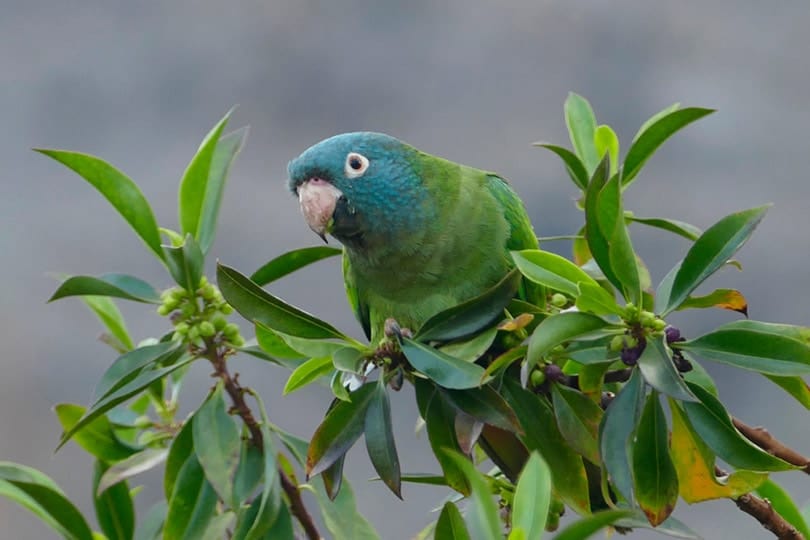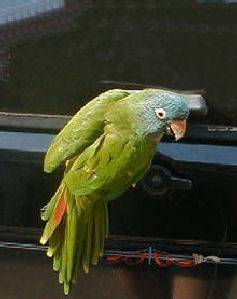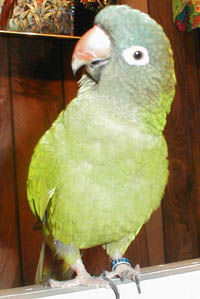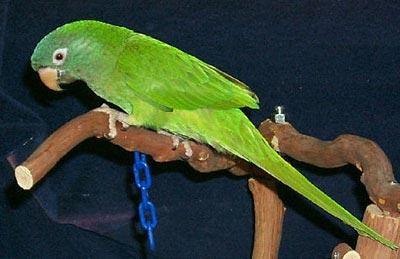
The Blue-crowned Conure, also referred to as the Sharp-tailed Conure is quite a character, as was demonstrated when this little bird became popularized by the movie “Pauli”!
The Blue-crowned Conure is one of the most magnificent of the Aratinga conures. Not only is it beautiful, but is easily identified with it’s attractive blue “crown”.
Though initially somewhat shy, the Blue-crowned conure is very intelligent and will become a very tame, loveable companion. They enjoy playing and can become very lively and active. Though they are generally a quieter bird than most of their Aratinga cousins, they can become rather loud and this should be taken into consideration when obtaining one as pet.
For more information about the care of Conures see:
Guide to a Happy, Healthy Conure
- Kingdom: Animalia
- Phylum: Chordata
- Class: Aves
- Order: Psittaciformes
- Family: Psittacidae
- Genus: Aratinga
- Species: acuticaudata
Scientific Name:
Subspecies:
- Sharp-tailed Conure
Aratinga acuticaudata acuticaudata - Blue-crowned Conure
Aratinga acuticaudata haemorrhous - Aratinga acuticaudata neumanni
Generally all three subspecies are referred to as the Blue-crowned Conure, though sometimes the name Sharp-tail Conure is applied specifically to the nominate species Aratinga acuticaudata acuticaudata which displays the most blue; while the name Blue-crowned Conure is used to describe the subspecies Aratinga acuticaudata haemorrhous that has less blue, restricted more to the forehead and the front part of the crown.
Distribution:
They are native to the central areas of South America from eastern Colombia and northern Venezuela south to Paraguay, Uruguay, and northern Argentina. They inhabit the more arid regions of tropical zones living in thickets, grasslands, savannahs, and along the edge of forests.
Description:
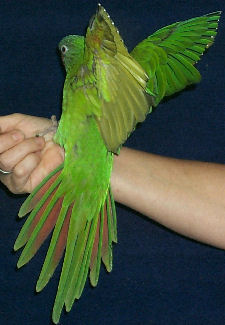
Photo © Animal-World
The Blue-crowned Conure is a small member of the parrot family.
The whole head as well as the cheeks and ear coverts are blue, and sometimes there is a tinge of blue on the breast. They have a generally green plumage that is more yellowish underneath. The outer wings are a blue-brown going to a chestnut brown on the secondary outer feathers.
The tail of the Blue-crowned Conure or “Sharp-tailed Conure” is long and tapered. This picture of a juvenile shows the beautiful maroons on the underside of the tail feathers.
The central tail on a mature bird is green with the outer feathers being more brownish-red tipped with a golden-olive.
The upper beak is horn colored with a gray tip and the lower mandible is grayish-black. They have a creamy white eye ring surrounding a yellow eye. The legs are pinkish brown.
A younger bird will have less blue on its forehead and crown with no blue on its breast.
Size – Weight:
The Blue-crowned Conure or Sharp-tailed Conure will get up to 11 3/4″ (37 cm), and weigh about 6.7 ozs (190g).
Care and feeding:
A roomy cage is required unless the bird is to be let out for extended periods. Many birds can spend most of their time on a play pen or parrot perch.
In the wild the Blue-crowned Conure eats berries, fruits, seeds, and nuts. As a pet they will enjoy a variety of sprouts, seeds, nuts, fruits, vegetables, and commercial pellets, as well as the same nutritional foods humans eat.
See About Conures: Housing and About Conures: Care and Feeding for more information.
Social Behaviors:
They are sociable and live in small groups or sometimes in flocks up to about 100 birds. They love to play, and can be fairly destructive if not watched. They can also be rather loud though not nearly as noisy as some of their Aratinga cousins such as the Nanday, Sun, and Jenday Conures. They make a real fun, playful pet and are very popular.
Breeding/Reproduction:
In the wild these birds nest in tree hollows. They have been found easy to breed in captivity and so are commonly bred. They are not dimorphic so will need to be sexed either through a DNA sampling, surgically, or through a chromosomal analysis.
The hen will lay three eggs which are incubated for about 24 days. The young fledge (leave the nest) in about 58 days.
See About Conures: Breeding/Reproduction for more information on breeding.
Potential Problems:
As with most Aratinga species this bird can be noisy, though it is quieter than some of the other poplar birds in this genus such as the Sun Conure, Jenday Conure, and Nanday Conure.
See About Conures: Potential Problems for information on illnesses.
Availability:
This bird is generally available. They can usually be found at pet stores and reputable breeders.
Activities:
Loves to climb and play. Provide lots of toys.
|
|
Photos Courtesy: Lisa Umstead | |
Featured Image Credit: Zoltan Tarlacz, Shutterstock
